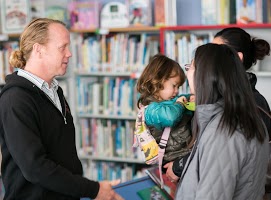Does engaging families matter? Link to this section
Research repeatedly shows that family engagement has a noticeably positive effect on student achievement and learning outcomes, and higher levels of family involvement show greater success for students (Grolnick & Slowiaczek, 1994; Halgunseth, 2009; Hill & Taylor, 2004). While we often see parental and family involvement decrease as a student moves up through middle and high school, family engagement continues to be a heavy predictor of achievement through adolescence (Epstein & Sanders, 2002; Hill & Taylor, 2004).
Family engagement increases social capital and unifies teachers & families, allowing students to receive consistent messages that increase competence, motivation to learn, and engagement in school (Grolnick & Slowiaczek, 1994).

Keeping families informed Link to this section
 There are many tools for informing families about what is happening in the classroom and how their student is progressing. Consider the purpose of your communication to determine which communication approach and tool is right for you, your students, and their families.
There are many tools for informing families about what is happening in the classroom and how their student is progressing. Consider the purpose of your communication to determine which communication approach and tool is right for you, your students, and their families.
In SFUSD, we carefully protect student privacy, which includes images of students or their work. Check out our best practices for sharing pictures from your classroom or of student work with families.
General classroom updates in the form of newsletters or digital postcards Link to this section
- Docs: Learn more about creating in Google Docs.
- Slides: Learn more about jumping in with Google Slides.
- Drawings: Learn the basics of Google Drawings.
- Sites: Learn about building a website with Google Sites.
Student-specific communications Link to this section
Organizing family participation Link to this section
 Another way to include families is to invite them to participate in your classroom. While this can mean inviting them to an actual event happening in the classroom, it can also mean leveraging their expertise or experiences in your instruction to create partnerships.
Another way to include families is to invite them to participate in your classroom. While this can mean inviting them to an actual event happening in the classroom, it can also mean leveraging their expertise or experiences in your instruction to create partnerships.
- Have guardians or families sign up for a time when they can come in. Learn more about using appointment slots in Calendar.
- Gather information from family members, such as areas of expertise, concerns they may have about their student, their availability, or their preferred method of contact, all in one place. Learn more about Google Forms.
References Link to this section
Epstein, J. L., & Sanders, M. G. (2002). Family, School, and Community Partnerships. In M. H. Bornstein (Ed.), Practical Issues in Parenting: Handbook of Parenting (2nd ed., Vol. 5, pp. 407-438). Mahwah, NJ: Lawrence Erlbaum Associates, Inc.
Grolnick, W. S., & Slowiaczek, M. L. (1994). Parents' involvement in children's schooling: A multidimensional conceptualization and motivational model. Child Development, 65(1), 237-252.
Halgunseth, L. (2009). Family engagement, diverse families, and an integrated review of the literature. Young Children, 64(5), 56-58.
Hill, N. E., & Taylor, L. C. (2004). Parental school involvement and children's academic achievement: Pragmatics and issues. Current Directions in Psychological Science, 13(4), 161-164.
This page was last updated on March 9, 2021

